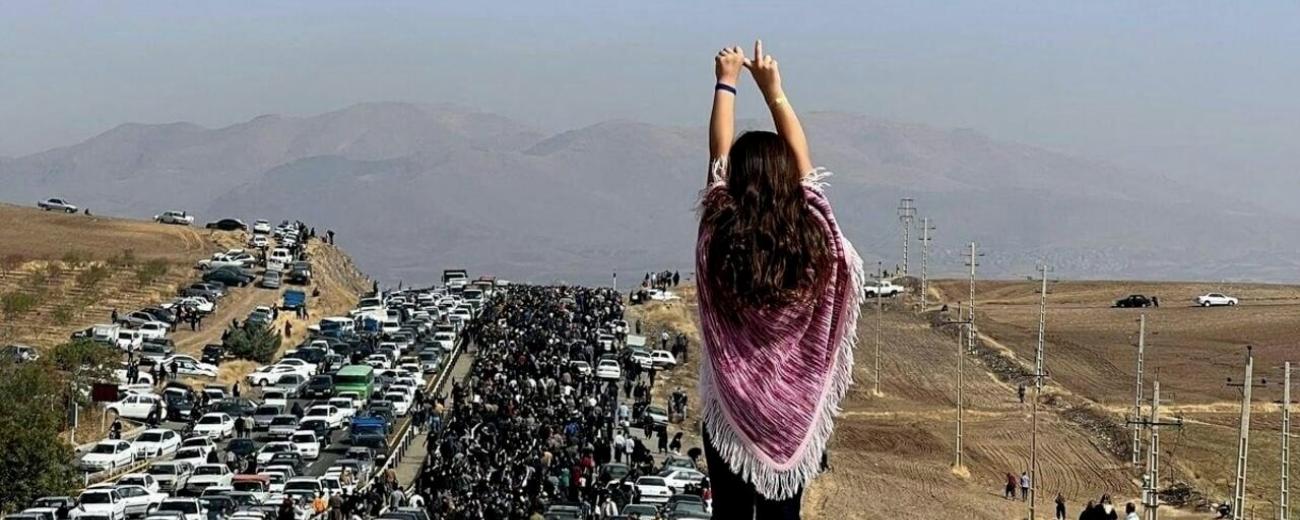
The Woman Life Freedom movement in Iran: One Year On

Key information
- Date
- Time
-
6:30 pm to 8:00 pm
- Venue
- Djam Lecture Theatre (DLT)
- Room
- Main Building, SOAS
About this event
This event reflects on the 'Woman Life Freedom' movement in Iran one year on from the brutal death of Mahsa Amini, which unleashed nation-wide female-led demonstrations across the country resulting in large scale incarcerations, deaths, and guns pointed at young people’s eyes - now blinded for speaking out on the streets.
Woman Life Freedom (Zan. Zendegi. Azadi) represented the hopes and aspirations of Iranians. Yet the raised voices and mobilised feet in and out of Iran wrought little change in the lives of Iranians living in Iran, while Iran’s geopolitical affairs persist. Iranian women shedding the state mandated hijab, and ordinary citizens seeking political and social freedoms are not high on the regional agenda. But the struggle for freedom in Iran perseveres.
The panel discussion, chaired by Roya Arab, with Malu Halasa, Dr Vali Mahlouji and Majed Neisi, will begin with a specially recorded address from Nadereh Chamlou. Together we will revisit the Woman Life Freedom movement and explore its wider socio-political impact and implications - within and outside of Iran.
The programme will begin with a welcome from SMEI Director Professor Lina Khatib, followed by a moment of female-led song to invoke the multitude of unheard voices in Iran and its neighbouring lands. We will also be celebrating the launch of Malu Halasa’s edited volume Woman Life Freedom: Voices and Art from the Women's Protests in Iran, published by Saqi.
Recording
About the speakers
Nadereh Chamlou is an international development advisor and non-resident senior fellow at the Atlantic Council’s empower ME initiative. During a thirty-year career as a senior advisor, at the World Bank, she held a range of positions including, managerial, technical and coordination, in such fields as economic management, environment, infrastructure, and gender. Her work has focused on private sector and entrepreneurship development, particularly on issues related to promoting growth and competitiveness through better utilization of the talent pool and benefiting from diversity and inclusion.
She co-authored the World Bank flagship report on “Corporate Governance: A Framework for Implementation,”, other publications include “Gender and Development in the MENA Region – Women in the Public Sphere”; “The Environment for Women’s Entrepreneurship in the MENA Region“; and “Women, Work, Welfare in the MENA Region”.
Malu Halasa is a writer and editor of five anthologies on the Middle East, including Woman Life Freedom: Voices & Art from the Women’s Protests in Iran, published this month by Saqi Books. She coedited Transit Tehran: Young Iran and Its Inspirations, with Maziar Bahari, and Kaveh Golestan: Recording the Truth in Iran, with Hengameh Golestan. Halasa writes fiction and her debut novel, Mother of All Pigs was reviewed by The New York Times as: ‘a microcosmic portrait of a patriarchal order in slow-motion decline’.
She has written for the Guardian, FT and the TLS. Formerly managing editor of the Prince Claus Fund Library in Amsterdam, editor at large for Portal 9 in Beirut, and a founding editor of Tank magazine in London, Halasa is the literary editor of The Markaz Review.
Majed Neisi, a London-based Iranian documentary filmmaker, has relentlessly followed the traumatic situations and events in the Middle East in a humanist and often observational manner, documenting ordinary people's resilience in dire situations. Neisi – born in 1981 in a makeshift hospital in southern Iran as Saddam was bombing the area – focuses on war and the plight of women. His films, cover the Middle Eastern region, in his own words "giving depth and consistency to what lies beyond media stories that are forgotten all too soon."
He’s worked as a producer and director of photography on various documentaries for BBC, ITV, Vice US, and other television networks. His films have been premiered at major international film festivals including IDFA, Dok Leipzig, Sheffield Doc/Fest, Visions du Reél, Cinéma du réel, and Festival dei Popoli.
Vali Mahlouji is a curator, founder of Archaeology of the Final Decade (AOTFD), advisor to the British Museum, Bahman Mohassess Estate and director of Kaveh Golestan Estate. Since 2010, the curatorial platform AOTFD has focused on excavating erased and forgotten cultural histories. It recovers and recirculates cultural artefacts that have been subjected to censorship, banned, endangered or deliberately destroyed and has placed artworks in international collections, including Tate Modern, Musée d’Art Moderne de la Ville de Paris, The British Museum, Smithsonian Institute, Victoria & Albert Museum and Los Angeles County Museum of Art (LACMA).
Mahlouji has curated extensively, including at Asia Culture Centre, SAVVY Contemporary, Whitechapel Gallery, Musée d’Art Moderne de la Ville de Paris, MAXXI Museum, Foam Fotografiemuseum, Art Dubai Modern. Mahlouji’s upcoming title, A Utopian Stage, is due to be published by Bloomsbury and Afterall in 2023.
Roya Arab is an archaeologist, musician & curator of cultural events celebrating SWANA history and cultural heritage with a focus on Iran. Roya has a BA in Archaeology (2003) and an MA in Public Archaeology from Institute of Archaeology, UCL, where she remained as Honorary Research Assistant until 2015. Her studies centre on the impact of socio-political and economic factors on ownership, interpretation, preservation and dissemination of cultural heritage and internationalist collaborative research. Since 2020 she has been an Associate Member of Centre for Iranian Studies, SOAS.
Her current research interests include what music in Iranian films reveal about changing attitudes to music in Iran, and the ancient connections between Iran and Zanzibar.
Registration
This event will take place in-person and will not be recorded. Seating is on a first-come, first-served basis.
Contact
- Organiser: SOAS Middle East Institute
- Contact email: smei@soas.ac.uk


